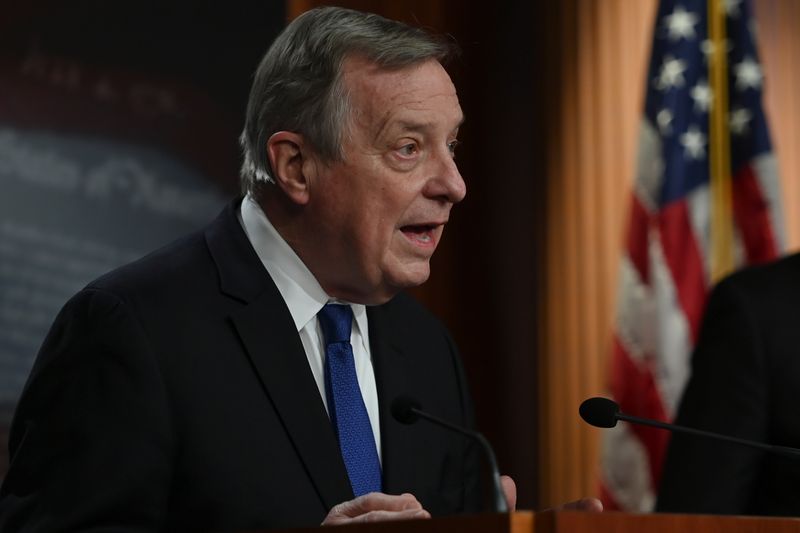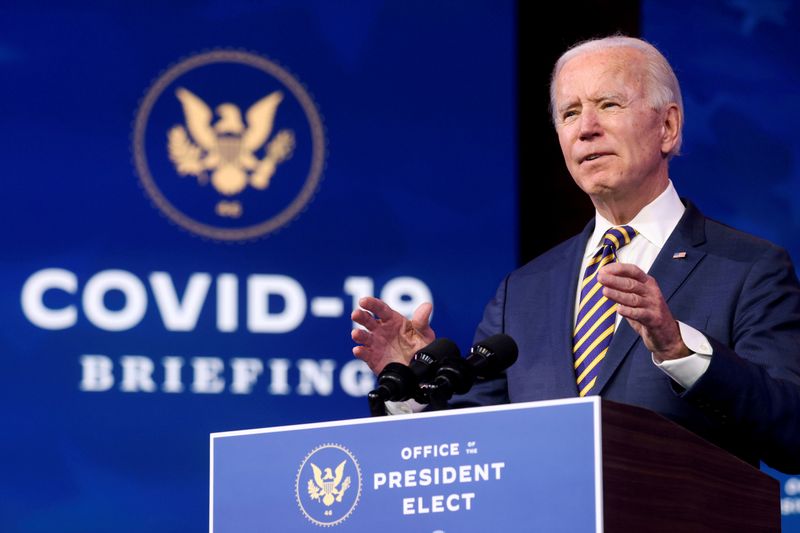By Susan Cornwell and Makini Brice
WASHINGTON (Reuters) - Democrats in the U.S. Congress on Tuesday took the first steps toward advancing President Joe Biden's proposed $1.9 trillion coronavirus aid plan without Republican support.
The Senate voted along party lines, with Democrats edging out Republicans 50-49, to open debate on a fiscal 2021 budget resolution with coronavirus aid spending instructions. Using this strategy unlocks a legislative tool needed for Democrats to enact Biden's package in the face of Republican opposition.
Republicans used the ploy when they controlled Congress in 2017 to pass a sweeping tax reform bill without Democratic support.
Republicans have pushed back on the Democratic president's price tag, which follows $4 trillion in COVID-19 aid last year.
Later on Tuesday, the House followed the Senate to begin debate on the budget resolution, voting 216-210, with no Republicans joining in support.
The debates are expected to last through the week. Once the budget resolution is passed, Democrats will still have to write a separate, detailed COVID-19 relief bill, meaning it could be early to mid-March before final votes are cast on a bill for Biden to sign into law.
Biden and his fellow Democrats are seeking a new round of direct payments to individual Americans to help stimulate an economy ravaged by shutdowns to curb the spread of the coronavirus, and want to provide more money for programs ranging from vaccines to additional unemployment benefits.
If such legislation is pursued without Republican backing, Democrats will have to be careful to craft a relief bill in such a way as to not alienate their more moderate members.
At an online luncheon meeting on Tuesday, Biden told Democratic senators he was willing to make some modifications to his proposal but that a Republican counter-proposal was inadequate, Senate Majority Leader Chuck Schumer told reporters.
Biden met with 10 Senate Republicans on Monday to discuss their scaled-back $618 billion plan.
"We’re off to a totally partisan start," Republican leader Mitch McConnell told reporters.
The pandemic has killed more than 446,000 people in the United States.
'WE THINK THAT'S WHAT IT'S GOING TO TAKE'
Jared Bernstein, a member of the White House Council of Economic Advisers, said on Tuesday that the Republican proposal fell far short in a number of areas, including funding to reopen schools. Republicans called for spending $20 billion on schools, compared with Biden's proposal for $170 billion.
"We think that's what it's going to take to reach people," Bernstein told CNN.
Schumer warned, in remarks to reporters, that if a package the size Republicans seek is enacted, "We'd be mired in the COVID crisis for years."
The 100-member Senate requires a 60-vote threshold to pass most legislation.
Approval of the budget resolution would activate a legislative tool called reconciliation, allowing for Senate passage of the final relief bill with 51 votes that would include 48 Democrats, two independents who align with them, and Vice President Kamala Harris.
Republican Senator Patrick Toomey was absent for Tuesday's vote. His office said he was delayed by bad weather. Toomey's absence meant that Harris was not needed to cast her first tie-breaking vote on Tuesday.
If the budget resolution measure passes both chambers it would mark the first time congressional Democrats had used the maneuver to flex their legislative muscle since winning razor-thin control of the Senate in two runoff elections last month in Georgia. They already controlled the House.
Schumer insisted there was still time to craft a COVID-19 aid effort with Republican support.
But Republicans view the reconciliation strategy as a partisan gambit that undermines Biden's repeated calls for unity.
"We passed five bipartisan COVID packages," said Senator Todd Young, a Republican. "It’s not a good signal that he (Schumer) is adopting a take-it-or-leave-it approach right after his president delivers an inaugural address based on unity.”

While expressing an openness to work with Republicans, the White House said Biden firmly supports the Democratic approach.
